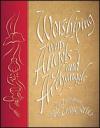Text: Ephesians 1:3-14
Blessings in Christ
Grace,
mercy, and peace to you from God, our Father, and from our Lord and Savior,
Jesus Christ. Amen. The text for the sermon this morning comes
from the Epistle, which was read earlier.
In our
modern age of today, letter writing has gone out the window. Now, we send an email to a person, using
Internet lingo that if you didn’t use it, you would have no idea what it was
you were reading. Our life stories are
now on our blogs for everyone to read. Most of our emails or blog entries are short, disconnected pieces that
make little or no sense to those who don’t know us. In our Epistle reading for this morning, Paul
does the complete opposite. His letter
to the church at Ephesus is concise, it has a purpose. Paul sees
life from a cosmic perspective, giving us a God’s-eye view of things. He begins by seeing the individual
Christian’s life in the light of eternity. Our present faith has an eternal cause, God’s gracious choice of us in
Christ before the foundation of the world. It leads us to an eternal goal; that we may live forever to the praise
of His glorious grace.
Paul
clearly wants to teach the readers of this letter to look beneath the surface
of life and understand its true nature. Life’s true nature is known only to God, summed up in Christ, and revealed
to us through the apostolic Word. The
impressive depth and breathtaking vision of the letter is all the more
remarkable in view of Paul’s confinement while writing it. Only faith in the promised love of God can
soar to such heights or sound such depths.
That is why
Paul begins our text for today with the following: “Praise be to the God and
Father of our Lord Jesus Christ, who has blessed us in the heavenly realms with
every spiritual blessing in Christ.” These words are a hymn of
praise. They aren’t found in a generic
hymnal for anyone who believes in a “higher power” or “supreme being.” These are words that a Christian speaks. It is directed to the God who is the
Father of our Lord Jesus Christ. Jesus
is the only way we can approach God, trust in Him, and have life everlasting
through His death.
For Paul,
he could not say these words of praise for the first part of his life. He was too busy crucifying Christians and
doing all he could to destroy Christianity until the fateful day on the road to
Damascus that he saw Christ and his eyes were opened to the gift of everlasting
life that Jesus Christ came to give to all of mankind. Paul, who was one of the staunchest at trying
to destroy Christianity, now became pastor or missionary to many of the
churches in the New Testament: Corinth, Rome, Galatia,
Ephesus, Philippi, Colossae, and Thessalonica. How is any of this possible? How can one kill Christians and then become
one of the chief teachers of the time?
The answer
to this is simple: “For he chose us in him before the creation
of the world to be holy and blameless in his sight.” Before
the world was born, God set His heart on having you as His own forever. Not only did He determine to embrace every
human being by the redeeming death of His Son, He also selected you personally
and individually in Christ before time began. He chose you, not because you were holy and blameless, but that you might be holy and blameless
before Him. The entire world can condemn
you, the devil may accuse you, and your own conscience convict you, but God has
determined that in Christ you are holy and blameless before Him.
All of this
was done out of love by God for us in Christ Jesus. He chose us not out of a requirement or by
law, but we were chosen purely of His grace. He chose us “before the creation
of the world.” Even before the world
began, God chose us to be “holy and
blameless in his sight.” But ask
yourself why. Why did God do what He
did? If God knew that there was going to
be the Adolf Hitler’s and the Saddam Hussein’s and Osama Bin Laden’s of the
world, then why did He choose us to be His children? The answer is simple: it is because of the
love that He has for His creation. God
is the Father and we are His children. Ask any parent what they would give to their children and they would
probably answer that they would give them the world. If something bad happened to them, they would
do anything to save them. That is
exactly what God did for us.
From the
moment that Adam and Eve ate from the tree of the knowledge of good and evil,
mankind became eternally separated from God. The only way to bring mankind back to God was through a Sacrifice like
no other. All throughout the Old
Testament, the chief priest would offer sacrifices to God on behalf of the
people. Once a year, the chief priest
would enter the temple and go to the Holy of Holies. These sacrifices failed in comparison to the
Sacrifice that would occur through the death and resurrection of Jesus
Christ.
Being a
child of God brings with it several benefits that we can barely grasp what it
means. First, “we have redemption through
his blood, the forgiveness of sins.” Stop and ask yourself if you
truly understand that we have redemption through the blood of a Lamb that was
sacrificed for us. When we were at the
Higher Things conference, one of the in-depth sectionals we attended was The
Hitchhikers Guide to the Liturgy. There,
the pastor presenting went through all the various parts of the liturgy. When he got to the Agnus Dei, “Lamb of God
you take away the sin of the world…,” he showed a picture of a lamb who had
its legs tied, pierced in the side, with blood flowing. This visual, while a bit disturbing, shows a
very moving picture of what it was like for Christ to give up His life and the
great cost it was for us to have redemption.
In the final part of our text, Paul
says quite a bit about what it is that we have received. “In him we were also chosen, having been
predestined according to the plan of him who works out everything in conformity
with the purpose of his will, in order that we, who were the first to hope in
Christ, might be for the praise of his glory. And you also were included in Christ when you
heard the word of truth, the gospel of your salvation. Having believed, you
were marked in him with a seal, the promised Holy Spirit, who is a deposit
guaranteeing our inheritance until the redemption of those who are God’s
possession—to the praise of his glory.”
In these final verses, Paul talks
about “we” and “you.” “We” refers
to Paul and his fellow countrymen, the Jews. “You” refers to the people of the Gentile nations, among whom Paul
preached and for whom he had been appointed an apostle. The basic thrust of the passage is to tell us
that God decided from eternity to unite Jew and Gentile believers in Christ, to
form one people who would be His “treasured possession.” Paul shows yet again that there is no
difference between Jew and Gentile, for all are saved through Christ.
We have been chosen by God to
receive forgiveness of sins, life and salvation. Note what Paul says. All this happens “according to the plan of
him who works out everything in conformity with the purpose of his will.” Paul doesn’t say that it is due to what we
do. The plans of men fail, and
all our personal visions of the future fade, but God’s resolution concerning us
cannot fail. Through faith created in us
by the Holy Spirit, we have heard the saving message of the Gospel. Through faith, “you were marked in him with a
seal, the promised Holy Spirit, who is a deposit guaranteeing our inheritance
until the redemption of those who are God’s possession—to the praise of his
glory.” By means of the same gospel He will
preserve us in faith until we reach our glorious goal; heaven. To assure us
that the inheritance of heaven will be truly ours, He sealed us with the gift
of the Holy Spirit. Just as a seal
serves to mark out an object as belonging to an individual, so the Holy Spirit
is God’s “seal of ownership on us.”
We have
been chosen to be the Father’s child. We
have been set free by the blood of Christ. We have been sealed by the promise of the Holy Spirit. These are the blessings that we have in
Christ Jesus, our Lord. Amen.
Now the peace of God which passes all understanding, keep your hearts and minds through faith until life everlasting. Amen.






